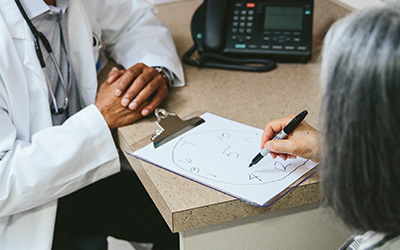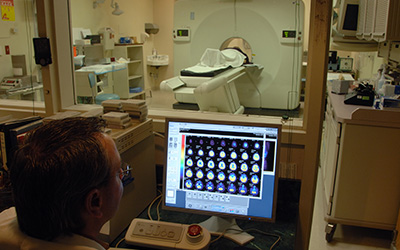what tests does a neurologist do to test for alzheimers disease
There is no single diagnostic test that can decide if a person has Alzheimer'south illness. Physicians (frequently with the help of specialists such every bit neurologists, neuropsychologists, geriatricians and geriatric psychiatrists) use a variety of approaches and tools to help make a diagnosis. Although physicians can almost always decide if a person has dementia, it may be difficult to identify the exact cause.
- Medical history
- Mental cerebral status tests
- Physical test and diagnostic tests
- Encephalon imaging
- Neurological exam
Medical history
During the medical workup, the wellness care provider will review the person's medical history, including psychiatric history and history of cognitive and behavioral changes. He or she volition want to know about whatever current and by medical issues and concerns, equally well every bit whatever medications the person is taking. The dr. will also ask about key medical conditions affecting other family members, including whether they may have had Alzheimer's disease or other dementias.
What to expect
Accept our interactive tour to learn what to expect when beingness evaluated for retention and thinking problems.
Take the Tour
Concrete examination and diagnostic tests
During a medical workup, the doc will likely:
- Inquire most nutrition, diet and use of alcohol.
- Review all medications. (Bring a listing or the containers of all medicines currently beingness taken, including over-the-counter drugs and supplements.)
- Check claret pressure, temperature and pulse.
- Listen to the heart and lungs.
- Perform other procedures to assess overall health.
- Collect blood or urine samples for laboratory testing.
Information from a concrete exam and laboratory tests can aid identify health issues that can cause symptoms of dementia. Common causes of dementia-similar symptoms are depression, untreated slumber apnea, delirium, side effects of medications, thyroid problems, certain vitamin deficiencies and excessive booze consumption. Unlike Alzheimer'southward and other dementias, these conditions oftentimes may exist reversed with treatment.
Be prepared for the doctor to inquire:
- What kind of symptoms accept you lot noticed?
- When did they begin?
- How often do they happen?
- Accept they gotten worse?
The doctor may too ask a family member to provide input about changes in your thinking skills and behavior. Run across our Communicating with Doctors or Health Care Professionals (PDF) to get ready for your appointment.
If the diagnosis is Alzheimer's or other dementia, yous or your loved one are non solitary. Join our free online community AlzConnected to share questions, experiences and applied tips on message boards and in live chat rooms.
Neurological exam
During a neurological exam, the physician will closely evaluate the person for issues that may signal brain disorders other than Alzheimer's. The dr. will wait for signs of stroke, Parkinson's disease, brain tumors, buildup of fluid in the brain, and other atmospheric condition that may impair memory or thinking.
If the evaluation does not indicate Alzheimer'southward affliction or other dementia, but the symptoms continue to go worse over fourth dimension, your md may need to order more tests, or y'all may wish to become a second opinion.
The physician will exam:
- Reflexes.
- Coordination, musculus tone and force.
- Middle movement.
- Speech.
- Sensation.
Domicile screening tests for dementia
A number of dementia screening tests accept been marketed straight to consumers. None of these tests have been scientifically proven to be authentic. Furthermore, the tests can have imitation-positive results, pregnant that individuals can have results proverb they have dementia when in fact they practice not. This is extremely unlikely to happen if the individual visits a physician to seek intendance and potential diagnosis. For these and other reasons, the Alzheimer's Association believes that dwelling screening tests cannot and should not exist used as a substitute for a thorough examination past a skilled doctor. The whole process of assessment and diagnosis should be carried out within the context of an ongoing relationship with a responsible and qualified health care professional person.
Mental cognitive status tests
Mental cognitive status testing evaluates memory, thinking and simple problem-solving abilities. Some tests are cursory, while others can be more than time intensive and complex. More comprehensive mental cognitive condition tests are often given by a neuropsychologist to evaluate executive office, judgment, attention and linguistic communication.
Such tests give an overall sense of whether a person:
- Is aware of symptoms.
- Knows the date, fourth dimension, and where he or she is.
- Can call up a short list of words, follow instructions and do unproblematic calculations.
Mini-Mental State Exam (MMSE) and the Mini-Cog test
The MMSE and Mini-Cog examination are 2 unremarkably used assessments.
During the MMSE, a health professional asks a patient a serial of questions designed to exam a range of everyday mental skills. The maximum MMSE score is thirty points. A score of 20 to 24 suggests balmy dementia, xiii to 20 suggests moderate dementia, and less than 12 indicates astringent dementia. On average, the MMSE score of a person with Alzheimer'south declines about two to four points each twelvemonth.
 During the Mini-Cog, a person is asked to complete ii tasks:
During the Mini-Cog, a person is asked to complete ii tasks:
- Remember and a few minutes after repeat the names of iii common objects.
- Draw a face up of a clock showing all 12 numbers in the correct places and a fourth dimension specified past the examiner.
The results of this brief examination can help a medico determine if further evaluation is needed.
Computerized tests cleared by the FDA
A growing surface area of research is the development of devices to administrate figurer-based tests of thinking, learning and memory, called cognitive tests.
The U.Southward. Food and Drug Administration (FDA) has cleared several computerized cognitive testing devices for marketing. These are the Cantab Mobile, CognICA, Cognigram, Cognivue, Cognision and Automatic Neuropsychological Cess Metrics (ANAM) devices.
Some physicians use computer-based tests such as these in addition to the MMSE and Mini-Cog. Computerized tests have several advantages, including giving tests exactly the same fashion each time. Using both clinical tests and calculator-based tests can requite physicians a clearer agreement of cognitive difficulties experienced past patients.
Low screen and mood assessment
In addition to assessing mental status, the doctor volition evaluate a person'southward sense of well-being to detect low or other mood disorders that can cause retention bug, loss of interest in life, and other symptoms that can overlap with dementia.
Genetic testing
Researchers have identified certain genes that increase the risk of developing Alzheimer's and other rare "deterministic" genes that directly crusade Alzheimer'south. Although genetic tests are bachelor for some of these genes, health professionals do non currently recommend routine genetic testing for Alzheimer's illness.
Hazard genes: While there is a claret test for APOE-e4, the strongest adventure gene for Alzheimer's, this test is mainly used in clinical trials to identify people at higher risk of developing Alzheimer'due south. Carrying this gene mutation only indicates a greater risk; it does not indicate whether a person volition develop Alzheimer'southward or whether a person has Alzheimer'south. Genetic testing for APOE-e4 is controversial and should only exist undertaken after word with a medico or genetic counselor.
Deterministic genes: Testing as well is bachelor for genes that cause autosomal dominant Alzheimer's disease (ADAD) or "familial Alzheimer'south," a rare form of Alzheimer's that accounts for 1 percent or less of all cases. ADAD runs strongly in families and tends to begin earlier in life, sometimes equally early as one'due south 30s. Many people in these families do not wish to know their genetic status, but some get tested to learn whether they will eventually develop the illness. Some ADAD families have joined clinical studies to assistance researchers amend understand Alzheimer's.
Learn more: Genetic Testing Fact Sheet (PDF) and Genetics and Alzheimer's.
Encephalon imaging
 A standard medical workup for Alzheimer's disease often includes structural imaging with magnetic resonance imaging (MRI) or computed tomography (CT). These tests are primarily used to rule out other weather that may crusade symptoms similar to Alzheimer's but require dissimilar treatment. Structural imaging can reveal tumors, evidence of small or large strokes, impairment from severe head trauma, or a buildup of fluid in the brain.
A standard medical workup for Alzheimer's disease often includes structural imaging with magnetic resonance imaging (MRI) or computed tomography (CT). These tests are primarily used to rule out other weather that may crusade symptoms similar to Alzheimer's but require dissimilar treatment. Structural imaging can reveal tumors, evidence of small or large strokes, impairment from severe head trauma, or a buildup of fluid in the brain.
In some circumstances, a dr. may utilise encephalon imaging tools to observe out if the individual has high levels of beta-amyloid, a hallmark of Alzheimer's; normal levels would suggest Alzheimer's is not the cause of dementia.
Imaging technologies accept revolutionized our agreement of the structure and part of the living brain. Researchers are studying other brain imaging techniques and then they can meliorate diagnose and track the progress of Alzheimer's.
Source: https://www.alz.org/alzheimers-dementia/diagnosis/medical_tests
Belum ada Komentar untuk "what tests does a neurologist do to test for alzheimers disease"
Posting Komentar